Welcome to MDGSF's Blog!
This is my github blog-
[C/C++] Generate random string
#include <iostream> #include <stdio.h> #include <stdlib.h> #include <ctime> #include <string.h> #include "unistd.h" using namespace std; void vGenRandom(char * str, const int iLen); void vGenAlphaCapital(char * str, const int iLen); void vGenAlphaLower(char * str, const int iLen); void vGenNumber(char * str, const int iLen); void vHelp(); #define ALPHA_NUM 26 #define NUMBER_NUM 10 #define CHARACTER_NUM 32 char g_acAlphaCapital[ALPHA_NUM+1] = "ABCDEFGHIJKLMNOPQRSTUVWXYZ"; char g_acAlphaLower[ALPHA_NUM+1] = "abcdefghijklmnopqrstuvwxyz"; char g_acNumber[NUMBER_NUM+1] = "0123456789"; char g_acCharacter[CHARACTER_NUM+1]= "!\"#$%&'()*+,-./:;<=>?@[\\]^_`{|}~"; int main(int argc, char *argv[]) { srand(time(NULL)); int iRet = 0; int iType = 0; //default type int iLength = 10; //default length int iNumber = 1; //default number while ((iRet = getopt(argc, argv, "t:l:n:h")) != -1) { switch(iRet) { case 't': iType = ::atoi(optarg); break; case 'l': iLength = ::atoi(optarg); break; case 'n': iNumber = ::atoi(optarg); break; case 'h': { vHelp(); return 0; } default: printf("Unknown parameters\n"); break; } } switch(iType) { case 0: { for (int i = 0; i < iNumber; i++) { char acRandom[BUFSIZ] = {0}; vGenRandom(acRandom, iLength); printf("%s ", acRandom); } } break; case 1: { for (int i = 0; i < iNumber; i++) { char acRandom[BUFSIZ] = {0}; vGenNumber(acRandom, iLength); printf("%s ", acRandom); } } break; case 2: { for (int i = 0; i < iNumber; i++) { char acRandom[BUFSIZ] = {0}; vGenAlphaCapital(acRandom, iLength); printf("%s ", acRandom); } } break; case 3: { for (int i = 0; i < iNumber; i++) { char acRandom[BUFSIZ] = {0}; vGenAlphaLower(acRandom, iLength); printf("%s ", acRandom); } } break; default: { printf("Unknown type: %d\n\n", iType); vHelp(); return 0; } } printf("\n"); return 0; } void vHelp() { printf("Usage: genRandom [options] [target] ...\n"); printf("Options:\n"); printf("\t-t type: (0:random, 1:number, 2:AlphaCapital, 3:AlphaLower)\n"); printf("\t-l length: the length of each obj\n"); printf("\t-n number: the number of random obj\n"); printf("\t-h help\n"); } void vGenRandom(char * str, const int iLen) { char acBuf[BUFSIZ] = {0}; strcpy(acBuf, g_acAlphaCapital); strcat(acBuf, g_acAlphaLower); strcat(acBuf, g_acNumber); strcat(acBuf, g_acCharacter); int iBufLen = strlen(acBuf); //printf("acBuf len = %d\n", iBufLen); int i; for (i = 0; i < iLen; i++) { str[i] = acBuf[ rand() % iBufLen ]; } str[i] = '\0'; } void vGenAlphaCapital(char * str, const int iLen) { int i; for (i = 0; i < iLen; i++) { str[i] = g_acAlphaCapital[ rand() % ALPHA_NUM ]; } str[i] = '\0'; } void vGenAlphaLower(char * str, const int iLen) { int i; for (i = 0; i < iLen; i++) { str[i] = g_acAlphaLower[ rand() % ALPHA_NUM ]; } str[i] = '\0'; } void vGenNumber(char * str, const int iLen) { int i; for (i = 0; i < iLen; i++) { str[i] = g_acNumber[ rand() % NUMBER_NUM ]; } str[i] = '\0'; }
-
[转]0-1背包问题
终于看懂了,哈哈。感谢这位兄弟。
http://blog.csdn.net/dapengbusi/article/details/7463968
问题描述
给定n种物品和一背包。物品i的重量是wi,其价值为vi,背包的容量为C。问应如何选择装入背包的物品,使得装入背包中物品的总价值最大?
对于一种物品,要么装入背包,要么不装。所以对于一种物品的装入状态可以取0和1.我们设物品i的装入状态为xi,xi∈ (0,1),此问题称为0-1背包问题。
举例分析
数据:
物品个数n=5,
物品重量w[n]={0,2,2,6,5,4},
物品价值V[n]={0,6,3,5,4,6},
(第0位,置为0,不参与计算,只是便于与后面的下标进行统一,无特别用处,也可不这么处理。)
总重量c=10.
Ø背包的最大容量为10,那么在设置数组m大小时,可以设行列值为6和11,
那么,对于m(i,j)就表示可选物品为i…n背包容量为j(总重量)时背包中所放物品的最大价值。
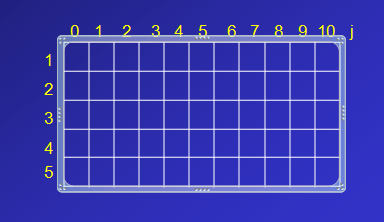
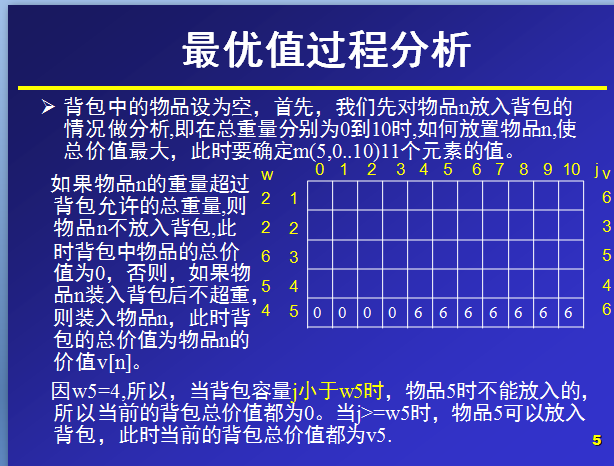
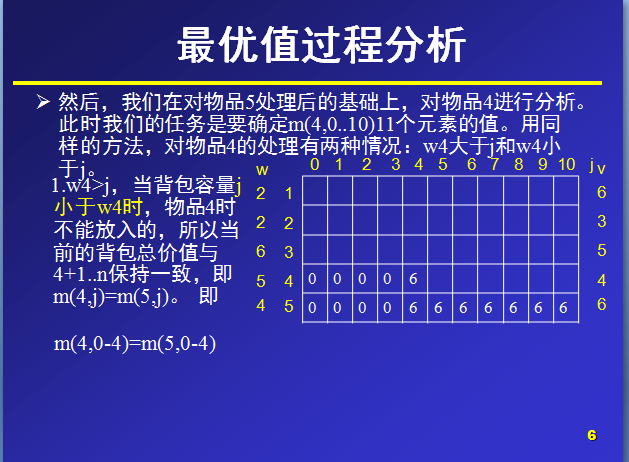
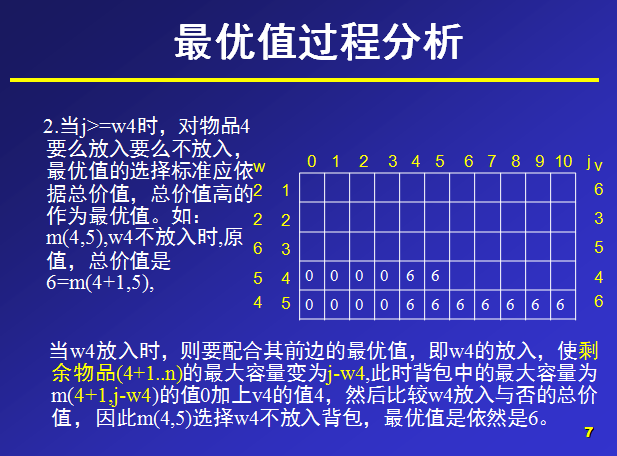
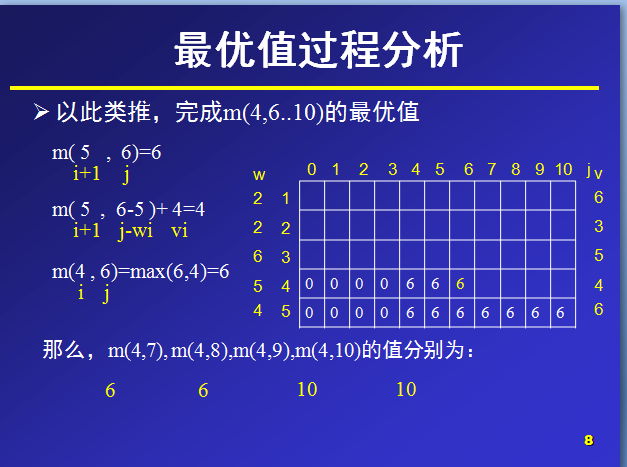
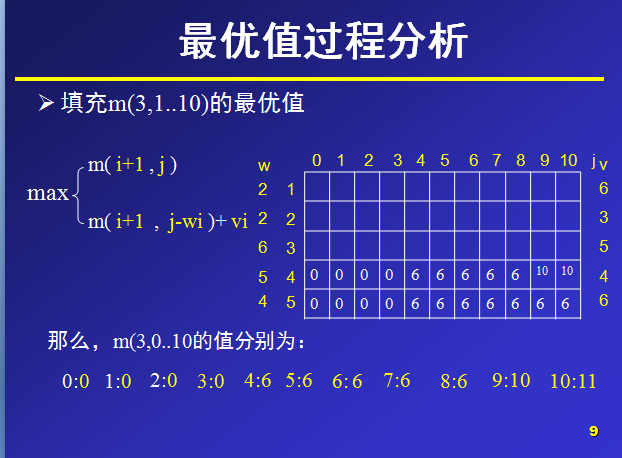
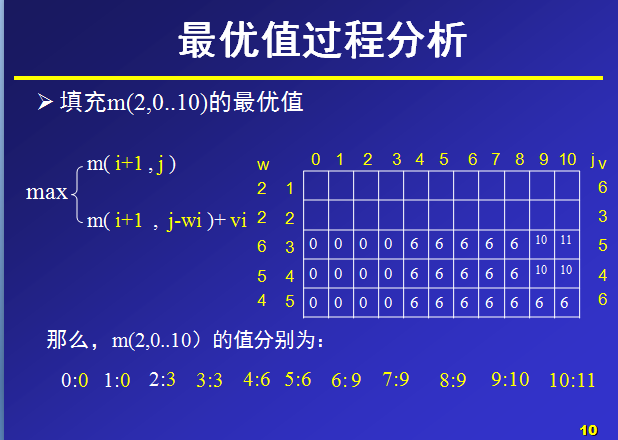
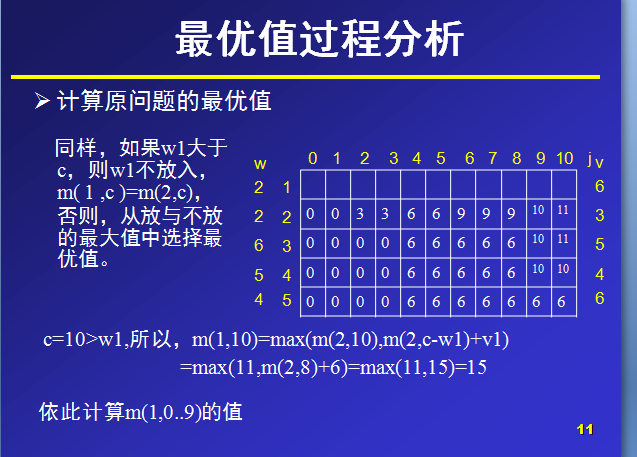
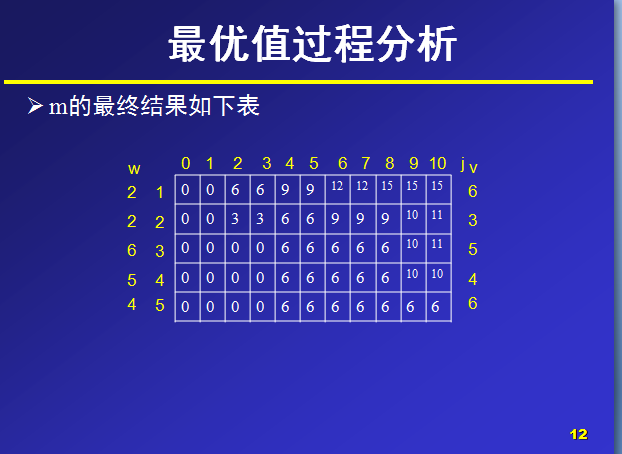
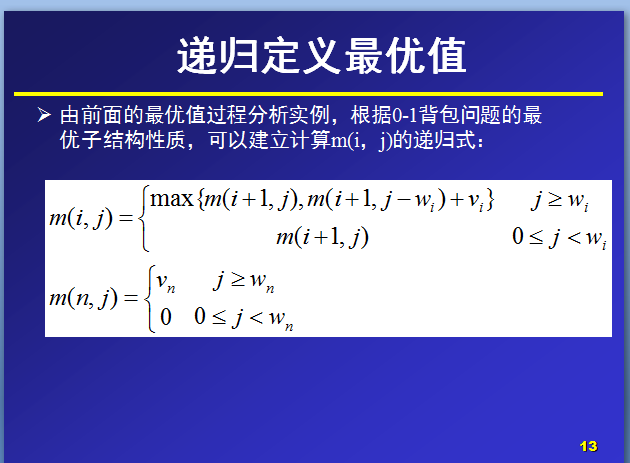
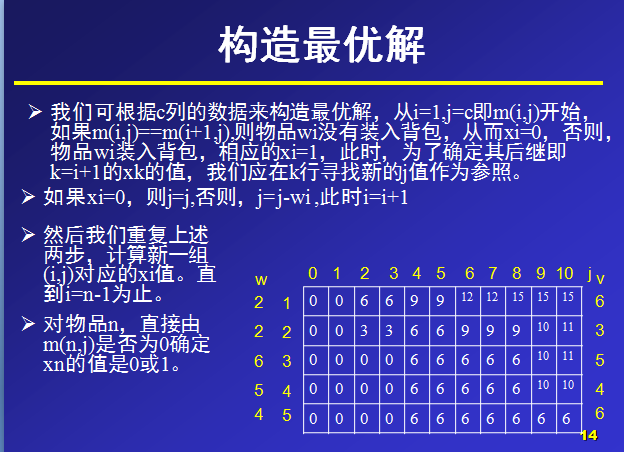
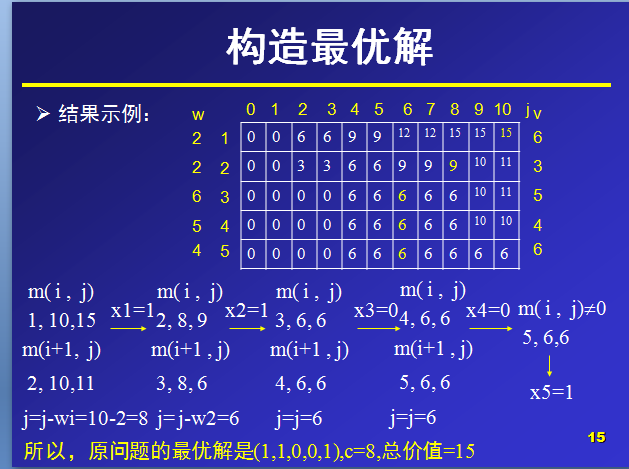
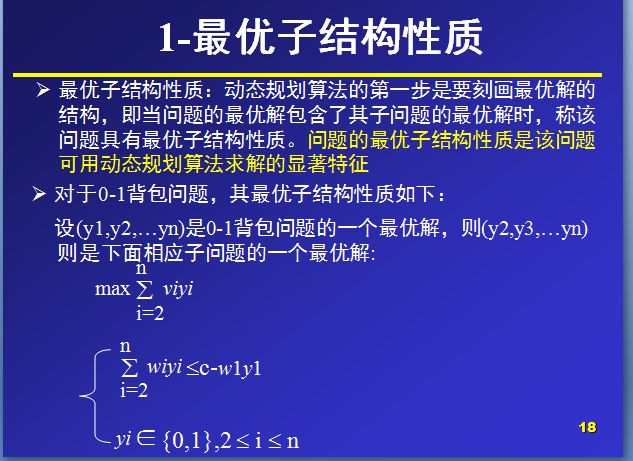
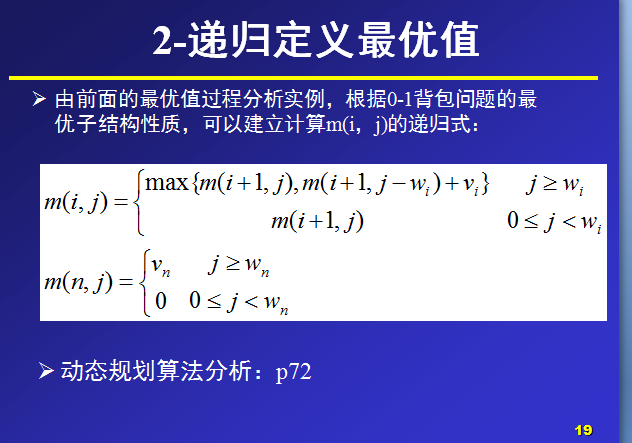
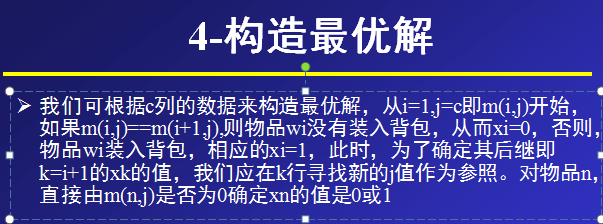
#include <iostream> #include <stdio.h> #include <stdlib.h> using namespace std; int iMax(int a, int b) { return a > b ? a : b; } /* * @param iCapacity: the bag's capacity. * @param piWeight: the array of obj's weight. * @param piValue: the value of obj's value. * @param iObjNum: the number of objs. * @param [out]ppResult: the result. * @return the max value the bag can hold. */ int iBag( const int iCapacity, const int * piWeight, const int * piValue, const int iObjNum, int **ppResult) { int i; int j; for (i = 0; i <= iCapacity; i++) { ppResult[iObjNum][i] = (i < piWeight[iObjNum]) ? 0 : piValue[iObjNum]; } for (i = iObjNum-1; i >= 1; i--) { for (j = 0; j <= iCapacity; j++) { if (j < piWeight[i]) { ppResult[i][j] = ppResult[i+1][j]; } else { ppResult[i][j] = iMax(ppResult[i+1][j], piValue[i] + ppResult[i+1][j-piWeight[i]]); } } } return ppResult[1][iCapacity]; } void answer( int iCapacity, const int n, const int w[], int **m, int x[]) { int j = iCapacity; int i; for (i = 1; i <= n-1; i++) { if(m[i][j] == m[i+1][j]) { x[i] = 0; } else { x[i] = 1; j = j - w[i]; } } x[n] = m[i][j] ? 1 : 0; } int main() { int i,j; int c = 10; int w[] = {0, 2, 2, 6, 5, 4}; int v[] = {0, 6, 3, 5, 4, 6}; int n = sizeof(w)/sizeof(w[0]) - 1; int ** m = (int**)malloc(sizeof(int*)*6); for (i = 0; i < 6; i++) { m[i] = (int*)malloc(sizeof(int)*11); } int iResult = iBag(c, w, v, n, m); printf("iBag = %d\n", iResult); for (int i = 0; i <= 5; i++) { for (int j = 0; j <= 10; j++) { printf("%2d ", m[i][j]); } printf("\n"); } int aiResult[100] = {0}; answer(c, n, w, m, aiResult); for (int k = 1; k <= 5; k++) { printf("%d ", aiResult[k]); } printf("\n"); return 0; }
-
[C/C++] 线程加锁 例子
apr_thread_mutex_lock(m_pstMutex); apr_int32_t iMaxTryTime = m_oLBServerVector.size(); apr_thread_mutex_unlock(m_pstMutex); while ( iMaxTryTime-- > 0 ) { char acServerIPAddr[MAX_IPADDRESS_LENGTH] = {0}; apr_uint32_t uiServerPort; apr_thread_mutex_lock(m_pstMutex); vector<SServerAddr>::iterator oLBIter = m_oLBServerVector.begin(); strcpy(acServerIPAddr, oLBIter->m_acServerIPAddr); uiServerPort = oLBIter->m_uiServerPort; apr_thread_mutex_unlock(m_pstMutex); iRet = m_iQueryFromServerTCP( acServerIPAddr, uiServerPort, acSendMsgBuf, usSendMsgLen, acRecvMsgBuf, &usRecvMsgLen, &ucMsgType); if(APR_SUCCESS == iRet) { break; } apr_thread_mutex_lock(m_pstMutex); SServerAddr stServerAddr = *oLBIter; m_oLBServerVector.erase(oLBIter); m_oLBServerVector.push_back(stServerAddr); apr_thread_mutex_unlock(m_pstMutex); } if(iRet != APR_SUCCESS) { return iRet; }(note:一个变量作为一个类的成员变量时,是多个线程共享的。作为临时变量,则是每个线程一份。)
这段代码的加锁有问题。 问题:当两个线程都执行到 erase 的时候,vector被移动了两次。
解决方法一:把 m_iQueryFromServerTCP()函数一起加锁,但是这样的话,锁太大,不建议采用。
解决方法二:在 erase 之前,先判断下当前的iter指向的是不是和之前取出来的一样。 一样的话就移动, 不一样的话就不移动。
解决方法三:把 iter 作为一个成员变量,这样就所有的线程都共享, 在构造函数中初始化 iter = m_oLBServerVector.begin(); 然后每次都取出 iter 当前指向的值, 失败的时候就把 iter 向后移动一格。 (这种方法相当于是一个ring,所有线程共享一个指针。)
解决方法四:用一个ring,每个线程都有一个自己的移动指针。
解决方法三 的代码如下:
apr_thread_mutex_lock(m_pstMutex); apr_int32_t iMaxTryTime = m_oLBServerVector.size(); apr_thread_mutex_unlock(m_pstMutex); while ( iMaxTryTime-- > 0 ) { char acServerIPAddr[MAX_IPADDRESS_LENGTH] = {0}; apr_uint32_t uiServerPort; apr_thread_mutex_lock(m_pstMutex); strcpy(acServerIPAddr, m_oLBIter->m_acServerIPAddr); uiServerPort = m_oLBIter->m_uiServerPort; apr_thread_mutex_unlock(m_pstMutex); iRet = m_iQueryFromServerTCP( acServerIPAddr, uiServerPort, acSendMsgBuf, usSendMsgLen, acRecvMsgBuf, &usRecvMsgLen, &ucMsgType); if(APR_SUCCESS == iRet) { break; } apr_thread_mutex_lock(m_pstMutex); if(strcmp(acServerIPAddr, m_oLBIter->m_acServerIPAddr) == 0 && uiServerPort == m_oLBIter->m_uiServerPort) { m_oLBIter++; if(m_oLBIter == m_oLBServerVector.end()) { m_oLBIter = m_oLBServerVector.begin(); } } apr_thread_mutex_unlock(m_pstMutex); } if(iRet != APR_SUCCESS) { return iRet; }
-
[C/C++] 代码检查
写完代码检查流程
1. 检查每个变量名是否合法,是否合理。 2. 检查每个函数名是否合法,是否合理。(函数是一个操作,通常是 动词+名词) 3. 检查类名是否合法,是否合理。(类名通常不应该出现动词) 4. malloc 是否有对应的 free。 5. new 是否有对应的 delete。 6. apr_thread_mutex_lock() 对应的 apr_thread_mutex_unlock() 不要写错了。 7. 放在 for,while 循环中的临时变量申明 是否可以放到循环的外面。 8. 循环体中的代码过长,考虑是否封装成一个函数替代。 9. 失败的时候记得输出log,成功的关键路径上也要记得输入log。 10. 对函数的输入参数进行合法性检查。 11. 将类的成员变量初始化。 12. 实现完一个函数,记得考虑是否需要多线程安全。 13. 对指针操作前,先判断是否为NULL。 14. 一个变量如果可以作为局部变量,就没有必要让它成为成员变量。 15. 给类加上 private: CClass(const CClass&); CClass& operator = (const CClass&); 16. 检查 if 和 while 中的 == 有没有写错了,写成了一个 = 。
-
[C/C++] sscanf basic usage
#include <stdio.h> #define MAC_LEN 6 int main() { char acMac[] = "00:30:AB:2F:7F:EA"; int aiMac[MAC_LEN] = {0}; int iNum = sscanf(acMac, "%x:%x:%x:%x:%x:%x", &aiMac[0], &aiMac[1], &aiMac[2], &aiMac[3], &aiMac[4], &aiMac[5]); printf("iNum = %d\n", iNum); printf("%02x:%02x:%02x:%02x:%02x:%02x\n", aiMac[0], aiMac[1], aiMac[2], aiMac[3], aiMac[4], aiMac[5]); return 0; }
-
[C/C++] 制表符 的长度
制表符在界面上显示的长度不是固定的。
制表符表示的是,从行首开始,每8字节算一个制表位,’\t’会在当前内容结束后第一个空的制表位处接上下文。
我猜你是想对齐后面的数字,但是制表符没有强制对齐的功能的,这样的话你不得不数一数你两句话之间差了几个制表位了。
#include <stdio.h> int main(int argc, char * argv[]) { printf("abcdefghijklmn\n"); printf("\tabcd\n"); printf("a\tbcd\n"); printf("ab\tcd\n"); printf("abcdefgh\tjklmn\n"); return 0; }输出如下:
abcdefghijklmn abcd a bcd ab cd abcdefgh jklmn
- Jekyll 1
- C/C++ 63
- Linux 59
- Web 25
- Qt 12
- Art 124
- Windows 17
- PHP 8
- Network 16
- GDB 3
- lwip 2
- DesignPattern 6
- pthread 6
- CPrimerPlus 9
- tester 3
- GO 75
- openssl 7
- FreeRTOS 9
- 数据库 4
- vk_mj 7
- transdata 3
- Git 7
- lua 20
- nginx 19
- boost 9
- python 18
- google 1
- Redis 1
- miscellanea 11
- life 2
- GCTT 9
- Rust 15
- C语言 2
- TeX 3
- fp 1